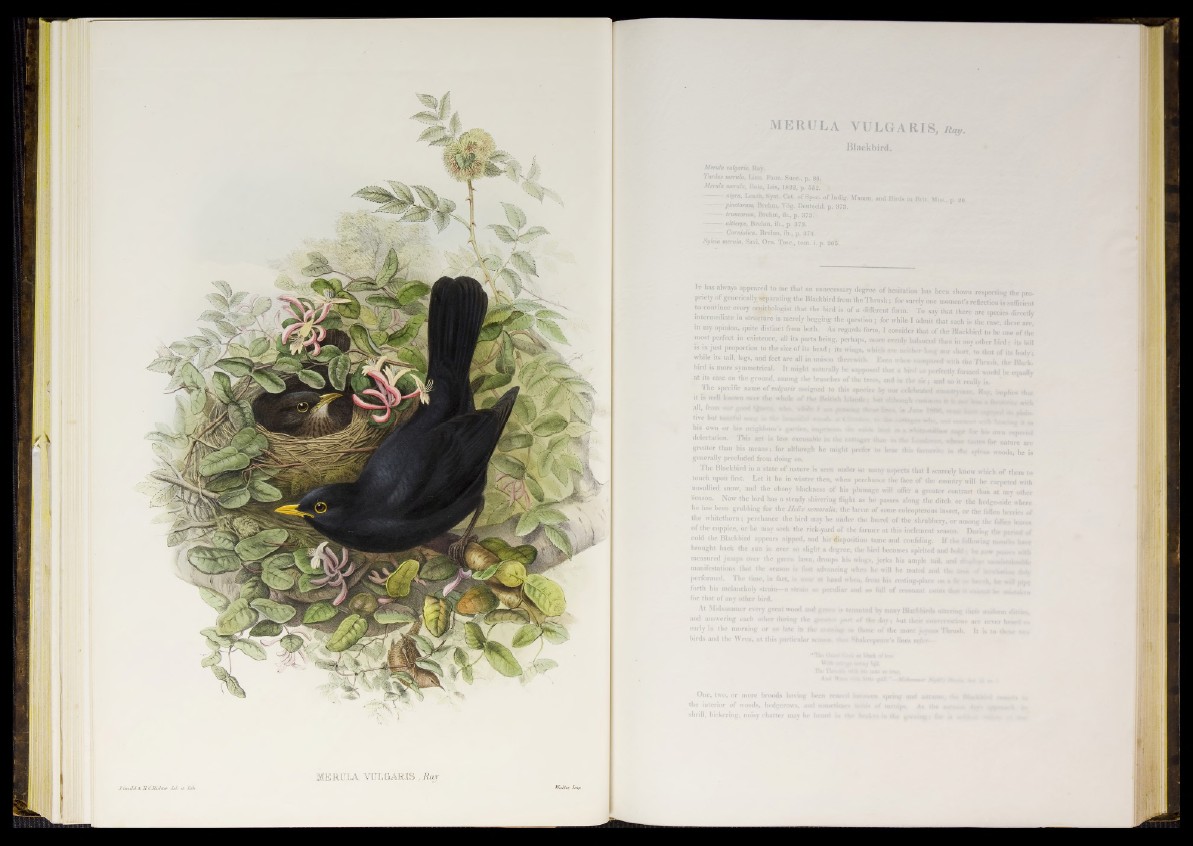
ME JUILA. VULGARIS ' R ay
WaLltr Imp.
MERULA VULGARIS, Hay.
Blackbird.
Merula vulgaris, Ray.
Turdus merula, Linn. Faun. Suec., p. 80.
Merula merula, Boie, Isis, 1822, p. 552. ;
nigra, Leach, Syst. Cat. of Spec, of Indig. Maram. and Birds in Brit. Mas., p. 20.
pinetorum, Brehm, Vdg. Deutschl. p. 373.
— truncorum, Brehm, ib., p. 373.'
— aliiceps, Brehm, ib., p. 373.
— Carniolica, Brehm, ib., p. 374.
Sylvia merula, Savi, Orn. Tose., tom. i. p. 205,
I t lias always appeared to me that an unnecessary degree of hesitation has been shown respecting the pro-
pnety o f gcnencally separating the Blackbird from the T h ra sh ; for surely one moment’s reflection is sufficient
to convince every ornithologist that the bird is o f a different form. To say that there are species directly
intermediate in structure is merely begging the question; for while I admit that such is the case, these are,
in my opinion, quite distinct from both. As regards form, I consider that o f the Blackbird to be one of the
most perfect in existence, all its parts being, perhaps, more evenly balanced »ban in any other bird • its b ll
is in ju st proportion to the size o f its h ead; its wings, which are neither ■ f¡ ,,o r sjlori to t jnfc e •' . .
while its tail, legs, and feet are all in unison therewith Even wbee e.unpam! with the Thrush the B1 ck
bird is more symmetrical. It might naturally be supposed that a bin» so perfectly formed would be H •
a t its ease on the ground, among the branches o f the trees, and in the a ir ; and so it really is
The specific name o f vulgaris assigned to this species by our celebrated c o r i in m - r ft» * r u
it is well known over the whole o f the British i * M * -• km afefeuasfh m
all, from our good * — innnftjr ^ r f-Tir. iti fm ffffBt a
five but tuneful mu z in the 1
his own o r his neighbour s gwtien, uaprñ*«x* ■ ¡?,; ^ »>-- ■* f, _
delectation. This act is less excusable in the eottaatr than m A# * ; —.. ww.m e. la-stes ior nature are
greater than his means; for although he might prefer to hear this favourite in the svfroti woods he is
generally precluded from doing so.
The Blackbird in a state o f nature is seen under so many aspects that I scarcely know which o f them to
touch upon first. Let it be in winter then, when perchance the face o f the country will be carpeted with
unsullied snow, and the ebony blackness o f his plumage will offer a greater contrast than a t any other
icason. Now the bird has a steady shivering flight as he passes along the ditch or the hedge-side where
he has been grubbing for the Ih ii.r nemoralis, the larva* of some coleopterous insect, or the fallen berries ,.f
the whitethorn ; perchance the bird may be under the laurel o f the shrubbery, or among the fallen leaves
of the coppice, o r he may seek the rick-yard of the farmer a t this inclement season. During the period o f
cold the Blackbird appears nipped, and his disposition tame and confiding. I f the billowing mouths hate
brought hack the sun in ever so slight a degree, the bird becomes spirited and hold - he now p.i,, i¡;
measured jumps over the green lawn, droops his wings, jerks his ample tail, and ill ----- , .
manifestations that the season is fuat advancing when he will he mated and (be r.r.riit ;
performed. The time, in fact, is nmr at haud when, from his resting-place on a 6t tie brenh, he will am*
forth his melancholy strain—a strain so peculiar and so full o f resonant notes (ju t « «. »jtnv.-t he mi «,.1
At Midsummer every great wood and grove is tenanted by many Black birds uttering thetr uniform «litio«.
early in the morning or so late in the eve»«« ¡*g those o f the more jofowt Thrush. It is to these tw%
birds and the Wren, at this particular sem m <«**< Shakespeare's fines rder-
One, two, or more broods h